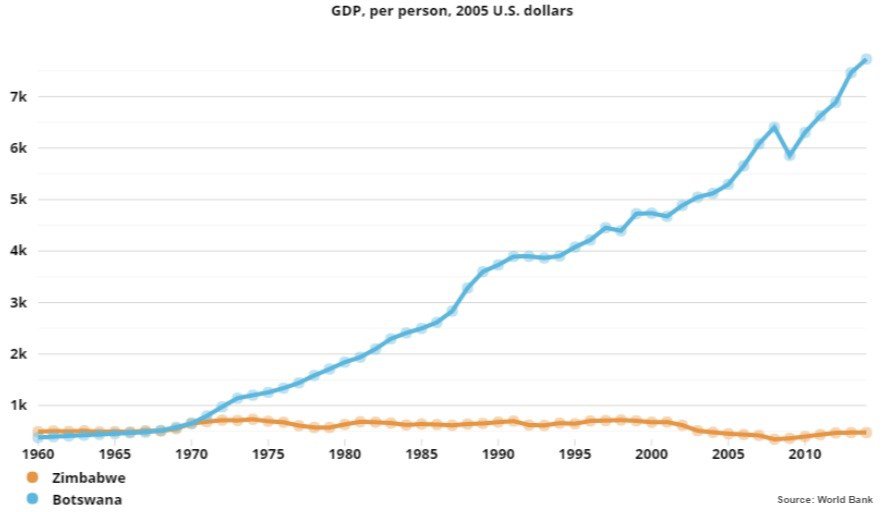59 Policies from One Year of Donald Trump – Article by David Bier

One year ago, Donald Trump thrust his bizarre, erratic, and incomprehensible campaign on the world. Much has been said about Trump’s “rhetoric” during his campaign — the racism, sexism, incivility, and much else besides — but rhetoric is not what makes a Trump administration a unique threat to the country. It is his policy proposals that should receive our closest attention and concern.
Below is a list of 59 “policies,” if you can dignify them with such a title, that Trump has proposed during his campaign. The list drives home how truly frightening a Trump presidency would be for the country and the world. Skimming the surface of Trump’s stream of consciousness brings out some particularly disturbing aspects of his agenda: notably, the way he singles out specific businesses and individuals for targeting by the government, as well as his obsessions with China, Mexico, Muslims, and immigrants.
Perhaps worst of all, Trump’s proposals expose how broad he thinks the powers of the presidency are: virtually infinite. There is never a glimmer of understanding that the government is bound by the Constitution, that the federal government has limited scope and authority, or that president is just one of three equal branches of the federal government.
Instead, it is Trump, and Trump alone, who will transform American laws, government, and society, from the top down. Trump will bomb and invade countries, Trump will steal their oil, Trump will kill deserters, torture suspects, bypass courts, ban Muslims, break treaties, and have the military do things like mass executions with bullets dipped in pigs’ blood — all while getting Americans to say “Merry Christmas” again.
Well, all I can say is Merry Christmas, America. Here’s what the primaries brought us this year.
Bold: attack on individual or business.
Italics: attack on Mexico or China.
Underlined: attack on immigration.
June 2015
1. Make Ford Scrap Expansion Plan in Mexico
August 2015
2. Deport 11 Million Immigrants
3. Triple Number of Deportation Agents
4. Force Cities and States to Help Deport Immigrants
5. Force Mexico to Pay for Wall on US Border
6. Strip US Citizenship from Babies Born to Immigrants
September 2015
7. Use FCC to Fine His Critic, Rich Lowry
8. Place 35% Tariff on Ford Cars Made in Mexico
9. “We Will Break” North American Free Trade Agreement
10. “Government Will Pay” for Health Care for “Everyone”
October 2015
11. Deport Syrian Refugees Legally in the US
12. Soldiers Who Desert Should Be Shot
13. Spend Tens of Billions on Border Wall
14. Keep Troops in Afghanistan
November 2015
15. Kill TPP Free Trade Agreement
16. Get Americans to Say “Merry Christmas”
17. Create Special Deportation Force to Remove Immigrants
18. “Bomb the S***” Out of Syria
19. Close Mosques in the United States
20. Create Database for Muslims
21. Bypass Courts in Mass Deportation Plan
December 2015
22. Restart Warrantless Surveillance, Metadata Collection
23. Kill Family Members of Terrorists
24. Washington Post Is a “Tax Shelter” for Amazon, Jeff Bezos
25. Ban All Muslim Travel to US
26. Shut Down “Parts” of the Internet
27. Issue Executive Order Mandating the Death Penalty for Killing Police
January 2016
28. Impose 45% Tariff on Chinese Products
29. Throw Bowe Bergdhal Out of a Plane in Afghanistan
February 2016
30. Tells Supporters to Knock Out Protesters
31. Use Eminent Domain for Economic Development
32. Tax Carrier-brand Air Conditioners Made in Mexico
33. Force Apple, Tim Cook to Break into iPhone for FBI
34. Keep Obamacare’s Individual Mandate for Health Insurance
35. Praises Mass Executions of Captured Soldiers with Bullets Dipped in Pigs’ Blood
36. Threatens Donor for Giving to Opponent’s Campaign
37. Prosecute Hillary Clinton
38. Proposes “Trade War” with China
39. “Open Up Libel Laws” to Sue Critical Press
March 2016
40. Force Apple to Make iPhones in US, not China
41. Force Military to Follow Illegal Orders
42. Prosecute Ed Snowden for “Spying” for Russia
43. “Torture” Terrorism Suspects
44. Increase Military Spending
45. Steal Iraqis’ Oil
46. “Pause” Legal Immigration
47. Send 20,000 or 30,000 Troops to Middle East
48. Trump Could Envision a Nuclear First Strike
49. Appoint Supreme Court Justice to Investigate Clinton’s Email
April 2016
50. Raise Taxes on the Wealthy
May 2016
51. Threatens Pfizer, Carrier, Ford, and Nabisco With 35% Tariff
52. Increase Minimum Wage
53. “Go After” Amazon for Anti-Trust and Taxes
54. Bomb Libya
55. Threatens “Mexican” Federal Judge Trying His Case
June 2016
56. “Keep Business Out of Mexico”
57. Ban All People from Countries with “History of Terrorism”
58. Surveillance of US Mosques
59. Ban Guns for People on Secret “Watch Lists”
David Bier is an immigration policy analyst at the Niskanen Center. He is an expert on visa reform, border security, and interior enforcement. From 2013 to 2015, he drafted immigration legislation as senior policy advisor for Congressman Raúl Labrador, a member of the House Judiciary Committee’s Subcommittee on Immigration and Border Security. Previously, Mr. Bier was an immigration policy analyst at the Competitive Enterprise Institute.
This article was published by The Foundation for Economic Education and may be freely distributed, subject to a Creative Commons Attribution 4.0 International License, which requires that credit be given to the author.
This TRA feature has been edited in accordance with TRA’s Statement of Policy.




